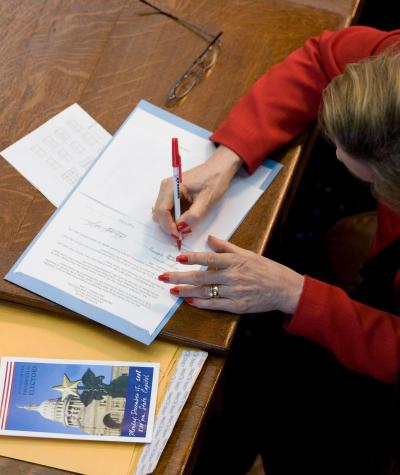States across the country — from Kansas to California to Michigan — have updated their election laws to conform with a bipartisan federal law passed by Congress that includes new legal deadlines for casting and counting Electoral College votes.
These new state laws add to the many safeguards that help ensure that states conduct their mandatory duty to certify elections on time.
Congress passed the Electoral Count Reform Act (ECRA), in 2022 with strong bipartisan support. Prior to that, process for casting and counting Electoral College votes was dictated by an outdated law rife with gaps and ambiguities, the 1887 Electoral Count Act.
CLC’s leadership played a critical role not only in crafting and advancing the ECRA, but in supporting states ahead of 2024 so that their presidential election procedures conform to the new federal law.
While most of the law’s updates concern Congress’ role in counting each state’s electoral votes, there are two changes that states must comply with to help our elections run smoothly.
First, the ECRA specifies that the state executive who must certify the state’s appointment of electors is the governor, unless state law enacted prior to the election designates a different executive to perform the duty.
Second, the ECRA provides that each state’s executive must certify the state’s slate of electors six days before the date on which the electors meet to officially cast their votes on “the first Tuesday after the second Wednesday in December.”
This year, the deadline is December 11. Now, under the ECRA, there is a firm deadline for certification as opposed to the more lenient "safe harbor” under the old law.
States need to complete postelection processes like canvassing, recounts and contests prior to the ECRA's certification deadline. The laws many states recently passed help make sure they are able to meet the ECRA’s certification deadline.
For example, Kansas altered its process for election contests and Colorado shortened its timeline for recounts. Nevada and Michigan updated both contest and recount procedures for timely completion of certification.
In addition to making administrative changes to comply with the ECRA, Arizona altered recount, canvass and certification timelines to comply with the law.
The ECRA takes significant strides toward protecting the will of voters and the peaceful transfer of power in 2024 and beyond. Many states have taken steps to prepare to timely certify their elections and meet the requirements of the new law.
Read CLC’s guidance for state officials on implementing the ECRA, learn more about election certification here and explore our new report: Roadmap to Electing the American President.

